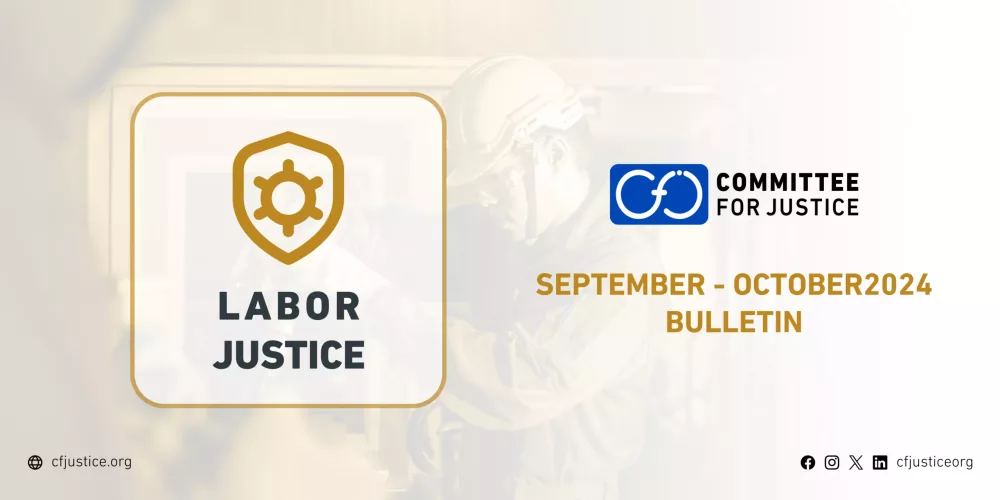The Committee for Justice (CFJ) has released its periodic bulletin on labor justice for September and October 2024, addressing the political and economic developments in Egypt and their impact on workers’ conditions.
The bulletin noted that Egypt experienced significant economic and political changes during September and October 2024. These changes ranged from worsening economic crises and government decisions that placed additional burdens on citizens to an increase in labor protests and arbitrary actions against workers.
The period was marked by the resurgence of the dollar crisis, with the official exchange rate in banks rising to 49 Egyptian pounds, exacerbating pressures on various economic sectors and citizens alike. Additionally, the government’s decision on October 18 to raise fuel and natural gas prices led to increased construction material costs and aggravated other crises, such as rising bread prices, compounding the hardships faced by Egyptian families. Amid these challenges, the proposed labor law appeared insufficient to provide meaningful solutions for workers, as violations continued to impact vast sectors of the workforce.
Tracking Strikes and Labor Protests
The bulletin documented a wave of strikes and protests reflecting workers’ dissatisfaction with the deterioration of their economic and professional conditions. On September 8, workers at “Roya Contracting” organized a protest at the “Talaat Al-Sokhna” and “Katameya” sites, demanding basic rights such as annual raises and cost-of-living bonuses that had been suspended for years. On September 23, workers at “Ocean Foods” in Borg El-Arab staged a sit-in, demanding wages that align with the government-mandated minimum wage. The situation escalated after their demands were ignored, leading management to shut down the factory as a punitive measure.
At the “Nag Hammadi Aluminum” plant, workers staged a partial and then full strike to protest cuts to their annual profits, despite the plant’s record profits. Meanwhile, workers at “Delta Sugar” demanded the dismissal of senior management over allegations of corruption and mismanagement of workers’ rights. These protests highlighted growing labor anger in the absence of tangible responses from authorities or employers.
Security Crackdown on Workers for Protest Activities
The bulletin underscored the repressive measures faced by workers participating in protests and professional demands, including arrests and enforced disappearances. On October 13, authorities arrested six employees following their participation in a conference supporting the rights of arbitrarily dismissed employees under the drug testing law. While one individual was released, the others remained in arbitrary detention.
Similarly, workers at “Samannoud Weaving” faced repeated security pressures to end their strike, which included the arrest of ten workers who were subsequently investigated. Upon their release, they faced punitive measures such as suspension from work and salary cuts.
Arbitrary Termination of Employment
The bulletin highlighted the rise in cases of arbitrary dismissal, reflecting the deterioration of workers’ rights protections. At the “Mondelez” factory in Alexandria, three long-serving workers were forced to resign under threat. These practices are indicative of a strategy to replace permanent employees with temporary contracts, exacerbating job insecurity.
Media organizations saw similar patterns of violations. For instance, the management of the “Consulto” website arbitrarily dismissed a journalist following the publication of an investigative report that angered the administration. At “Leoni Egypt,” several workers were terminated without legal justification, reflecting a trend of exploiting temporary labor and the lack of legal oversight.
Violation of Union Organization Rules
The bulletin also addressed the arbitrary interventions targeting union organizations by Egyptian authorities. Despite a court ruling obligating the Ministry of Tourism to conduct new elections for the Tour Guides Union, the Minister of Tourism issued a decision to form a temporary committee to manage the union, ignoring the court ruling from February 2024. This interference underscores a continued policy of undermining union independence and preventing workers from exercising their democratic rights to organize.
These developments reveal the escalating crises faced by workers in Egypt amidst growing economic and social pressures. Persistent violations—whether through strikes, security crackdowns, or arbitrary dismissals—underscore the urgent need for comprehensive reforms to protect workers’ rights, improve working conditions, and ensure the enforcement of labor laws. In the absence of genuine responses to these demands, the risks of social instability and growing public discontent are likely to increase.






